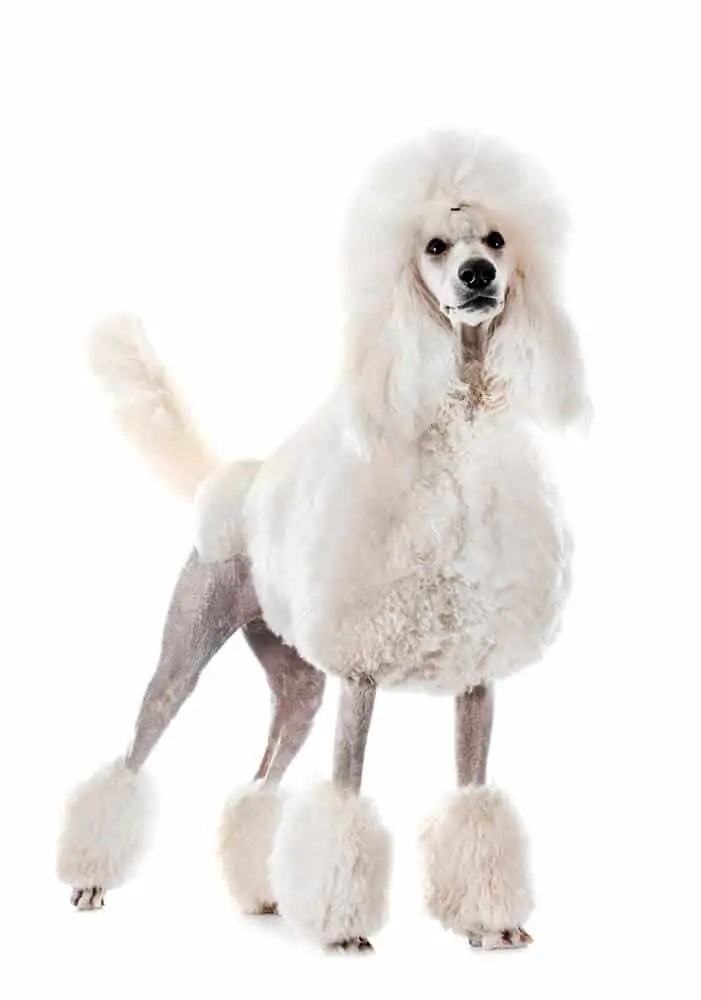Last Updated on
What happens when you mix a Border Collie with a Poodle?
You get a Border Collie Poodle mix, or a Boodle—one of the most intelligent types of Poodle mix dogs.
They are intelligent, playful, affectionate, and energetic dogs that’ll surely keep you entertained at all times.
Getting a dog is a big responsibility, so before you get yourself a Border Collie Poodle Mix, you must know everything about this dog.
This article will help you become a better dog parent, so keep reading and discover all the interesting facts about these little furry puppies.
Border Collie Poodle Mix: A Quick Look At The Characteristics
| Lifespan | 12 to 15 years |
| Weight | 30 to 60 pounds |
| Height | 15 to 22 inches |
| Temperament | Loyal, affectionate, social, active, and intelligent |
| Colors | Brown, black, blue merle, multi-color |
Border Collie Poodle Mix: Temperament and Characteristics
The Border Collie Poodle mixed breed—a cross between a Border Collie and Poodle puppies.
Border Collie Poodle mixes, also known as Bordoodles and Colliepoos, have inherited the traits of its parent breeds. So to best understand the Bordoodle, let’s take a look at each of its parents.
Border Collies

The Border Collie is one of the best herding dogs and was originally bred in Scotland.
These dogs are extremely energetic, so they need their owner’s attention at all times. You must keep a Border Collie engaged with some playtime, exercise, or mental stimulation.
Border Collies are also one of the most intelligent dog breeds, but to keep their intelligence alive, they need enough exercise and mental stimulation.
That being said, Border Collies are slightly sensitive and do not like too much socialization.
Poodles

Poodles are also full of energy, fun, and confidence. This breed is also counted among the most intelligent dog breeds. You can find poodles in different sizes like Toy Poodles, Miniature Poodles, and Standard Poodles. Poodles don’t shed, and instead, require brushing and combing to prevent mats.
Border Collie Poodle Mix (Bordoodle): The Best of Both Parent Breeds
Now when you cross a Poodle with a Border Collie you get an incredibly intelligent and active dog as both the Border Collie and Poodle are highly intelligent and energetic. Bordoodles are not the right dogs for someone who want a lazy dog.
Temperament
Just like the parent breeds, Bordoodles are an energetic and intelligent working breed. Bordoodles must be part of active families who will commit to exercise and mental enrichment, otherwise the Bordoodle will become restless and could have behavior issues.
Bordoodles are loyal and affectionate and love to be part of the pack. They make excellent companions for families who enjoy going on long walks, hikes, and outdoor adventures.
Energy
Bordoodle puppies are always high on energy. They love to play, go outdoors and participate in exciting activities. They are easily trainable and friendly, so they will easily mix in any environment. Especially if you love outdoor activities like camping or hiking, this pup will be your best companion.
Bordoodles are fond of small children, so if you have young kids, your pup would love to play with them. Moreover, Bordoodles are a great family dog and love playing with both big and small humans.
Socialization
Bordoodles need proper socialization; otherwise, they get anxious and won’t behave well in social settings.
It’s important to introduce Bordoodles to different dogs, humans, and experiences as early as possible. It’ll prevent it from being overprotective or from becoming too shy.
Intelligence
Both Border Collies and Poodles are the smartest dogs among all dog breeds, and it’s quite obvious that Bordoodles have inherited the same trait from their parents.
They are quick at learning commands, socializing, and adapting to new environments if trained at the right time.
Bordoodle Appearance
Bordoodle puppies look depends a lot on their parent breeds. Both Border Collies and Poodles come in different sizes and colors. So the Bordoodle puppy’s appearance depends on the size, shape, and coat color of its parents.
You will find the mini, medium, and standard-size Bordoodles. Here are the details of each type:
Bordoodle Size
Mini Bordoodles
Mini Bordoodles are the litters of a small Border Collie and a Mini Poodle.
If you live in a small apartment and don’t have outdoor space, Mini Bordoodles are best for you. Keep in mind that Mini Bordoodles still have plenty of energy and requires lots of walks and playtime through each day.
Medium Bordoodles
As you can tell by the name, a medium-sized Collie Poodle mix is not too small and not too large. These dogs weigh from 30lbs to 40lbs and grow 18 inches tall. They are always very energetic and love to hike, run and participate in all fun activities.
Although these medium-sized dogs prefer big spaces, they can adjust to the apartment lifestyle if you keep them engaged.
Standard Bordoodles
Standard Bordoodles grow up to 20 to 22 inches and weigh approximately 40lbs. Get a standard size Bordoodle only if you have a very active lifestyle. They need lots of exercise and activities to keep them going. Also, standard Bordoodles are best suited for bigger living spaces, but if you have time for enrichment and lots of walks, you can live happily with a Standard Bordoodle in a smaller living space.
Bordoodle Coat
Bordoodles have a fluffy and wavy or curly coat. They get the fluffy coat from the Border Collie and the curly coat from the Poodle parent.
Bordoodle puppies are usually low-shedding dogs and are often referred to as “hypoallergenic”.
However, no dog can be 100% hypoallergenic. Dog allergies result from a protein found in the dog’s dead skin cells (dander), saliva, and urine.
Dogs who don’t shed often spread less dander around, which is why some people notice their allergies improve around these dogs.
But that doesn’t mean they won’t have an allergic reaction if they come in contact with this protein in other ways, say, through a lick.
If you have allergies and want a dog, it’s recommended to speak with an allergist for their professional opinion.
With that being said, the level of shedding for a Bordoodle can’t be guaranteed. How much your pooch sheds depends on which parent it takes after. If your pup takes after its Poodle parent, it will shed less than if its coat is more like the Border Collies.
Bordoodle Colors
The color of these little pooches again depends largely on their parent breeds. Grey, white, golden, brown, black, black and white, and apricot are common colors in which you can find these puppies.
But a solid color border collie poodle mix is rare. They are mostly bi-colored like their parents. Here are some of the popular Bordoodle puppy colors-
Black/Grey And White
It is the most common color for Bordoodles. They usually would have a black body with white patches around the eyes, chest, and ears.
Blue Merle Bordoodle
Blue merle Bordoodle dogs must have blue merle parents. But it can also be bred using a cream or white color Poodle and a blue merle Border Collie.
But what does a blue merle Bordoodle look like?
Blue merle is a mix of blue, white, and tan colors. And no, it’s not an actual blue. Think of of a cool grey with blue undertones!
Their whole body is covered with patches of this color. Blue merle is a unique and sought-after color, so these pups are pretty expensive.
Blue merle is a genetic trait, so you should not breed two blue merles together; otherwise, it may lead to blindness or deafness in the dog.
Brown Bordoodle
Brown Bordoodles have a solid brown body with white patches here and there. Solid brown Bordoodles are also a bit rare since these puppies are mostly dual-colored.
Black Bordoodle
Like the brown Bordoodles, black ones are also rare. These have a solid black body, sometimes with tiny white patches around the chest. Solid color Bordoodles, like the brown and black, ones are bred from dark color Poodles and Border Collies. These colors are also less popular because pet lovers prefer the dual or merle Bordoodles more.
Bordoodle Health Issues and Concerns
Mixed breed dogs like Bordoodles are less prone to genetic health problems than purebred dogs, so long as they are being bred with healthy parents.
But they still can catch health issues common to dogs.
The following are the health concerns that are more common to Bordoodle.
Collie Eye Anomaly (CEA)
CEA is a common eye disease found in Border Collies and Sheepdogs. CEA does not allow the blood vessels under the retina to develop, which may lead to blindness.
Your Bordoodle puppy may inherit this genetic disease from its Border Collie parent.
But CEA can be detected with a genetic test, so breeders should take the test to prevent the gene from passing on to upcoming generations.
Make sure to ask your breeder if they test for Collie Eye Anomaly.
Epilepsy and Seizures
Epilepsy is a common disease in Poodles, and there is a chance of Bordoodles getting it from their standard Poodle parents.
Epilepsy is a neurological condition that leads to seizures. Although there are different drugs for epilepsy, these may have side effects.
Early Onset Deafness
Border Collies are more prone to early-onset deafness. With this condition, the dogs lose hearing ability by the age of three or five.
Bordoodles may inherit this health issue from the Border Collie parent.
Elbow and Hip Dysplasia
This is another common health concern found in large dog breeds, so standard Bordoodles are more prone to this condition. It’s a joint disease that happens when the dog’s socket joint or ball is malformed. Hip dysplasia can lead to pain and moving difficulty in dogs.
Addison’s Disease
Addison’s Disease is an autoimmune disease that happens when the dog’s immune system attacks adrenal glands and results in steroidal hormone deficiency. Some of the common symptoms of Addison’s disease are- loss of appetite, depression, and gastroenteritis.
Sebaceous Adenitis
Sebaceous Adenitis is an inflammatory skin disease that occurs when the immune system attacks the skin’s sebaceous glands. Scaling and alopecia are the common symptoms of this disease, so if you notice these, immediately take your dog to the vet.
Exercise-Induced Collapse
Exercise-Induced Collapse is a physical condition that may cause temporary paralysis and hindleg weakness while exercising. It’s not a very serious health concern, and your pup will recover after some good rest but prevent them from performing intense exercises for a short duration.
Bloat
Bloating is common in large and broad chested dogs, like the Standard Poodle.
It occurs when the dog’s stomach is filled with gas and twists, cutting off the blood supply. Common symptoms of bloating are a firm and swollen stomach, distress, and retching.
Don’t let your dog eat too fast or too soon after exercise to prevent bloating.
Grooming a Bordoodle
Although the Border Collie doesn’t require lots of grooming, Poodles do. Therefore, a Border Collie Poodle mix requires plenty of brushing and combing, and frequent trips to the groomers.
While you can groom your Doodle at home, it’s often a lot of work and requires practice and patience.
Aim to brush and comb your Bordoodle thoroughly once a day—or once every two days—and take them to the groomers every six to eight weeks.
If you don’t think you’ll like all the brushing, you can keep your Bordoodle shaved with short hair, but this will require more frequent trips to the groomers.
Training and Exercise For Bordoodle Puppies
Training and exercise should be a crucial part of Bordoodle’s daily routine if you want a healthy dog. Morning or evening exercise of 45 minutes to an hour is a must since it’s an active dog breed.
By exercise, we don’t mean a simple stroll around the compound or the park. It needs intense exercise to divert its energies in the right direction. Apart from exercise, it needs enough playtime as well.
If you decrease your dog’s playtime, it may get destructive and start herding other pets or children.
Training your Bordoodle won’t be difficult. It’s a smart breed, so it would quickly learn the commands. It’s also quite fun to watch them getting trained. To make the process more interesting, you can give them some rewards too.
Food for Border Collie Poodle Mixes
Feed your Bordoodle a high-quality dog food.
Some Bordoodles owners note that their Bordoodles have sensitive stomachs and can’t digest chicken. If you notice your Bordoodle is itching or has stomach issues, try proteins aside from chicken.
Apart from protein, add carbs, fiber, vitamins, minerals, and omega fatty acids to your Bordoodle’s diet. A balanced dog food will have everything you need so make sure to speak to your vet or your breeder for food recommendations.
You also must feed your dog according to his age. For instance, a pup will need a different kibble than an adult kibble.
Cost of a Border Collie Poodle Mix Puppy
You can get a Bordoodle for $1,500 to $4,000. The cost varies based on coat, color, size, and breeder. Adopting or rescuing is another best option, but you’ll most likely find a grown-up dog. Take a look through our directory of Doodle dog rescues to see if there are any in your area. You can also look through our list of Border Collie rescues to find a Border Collie mix dog.
If you’re buying from a breeder, make sure to only get it from reputable breeders and avoid puppy mills at all costs. Check all vaccination and other documents while getting to avoid any health risks.
Do You Want a Bordoodle Puppy?
These intelligent dogs are the best puppies for both first-time dog owners and people who already own pets. The Bordoodle loves to play, cuddle, have fun with their owners, and make a great family dog. Take some time out from your everyday schedule for some playtime; otherwise, you’ll have a bored—and destructive!—dog on your hands.
Lastly, don’t forget to brush your dog’s hair regularly to keep them smooth, untangled, and beautiful!
Do you want a Bordoodle puppy? Leave a comment below and let us know!
This article may include affiliate links. www.travellingwithadog.com is a participant of Amazon.com Services LLC Associates Program. As an Amazon Associate, I earn a commission from qualifying purchase. www.travellingwithadog.com participates in other affiliate programs, and recieves commissions when purchases are made through the links. The cost is not inflated to account for the commission earned.
Veterinary Disclaimer: travellingwithadog.com is not a substitute for veterinary advice and does not intend to provide any type of veterinary advice for your animals. Please consult your vet for any questions you have regarding your pets health.

About the Author:
Dana owns a Sheepadoodle and a rescue merle Labradoodle. Her first dog growing up was a white Toy Poodle and she’s loved dogs ever since. She has years of experience fostering dogs and has helped find homes for a variety of different breeds, both large and small! After seeing so many dogs end up unwanted and in shelters, she began blogging about different dog breeds (specifically Doodle dogs, since that’s what she knows best) to help people make informed choices when adding a new member to their family.
When Dana’s not brushing her Doodles’ hair (it takes a lot of time for two!) you can find her playing nose work games and fetch with her two amazing pups.
Learn more about her here.

